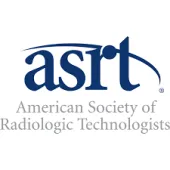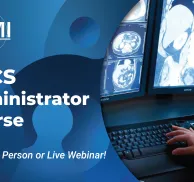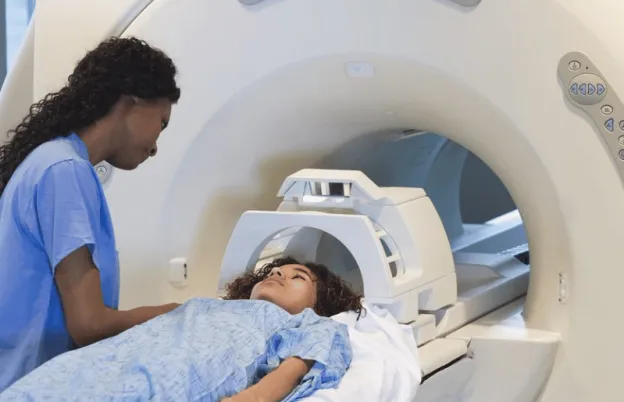
MRI Registry Review
About this Program
Explore better health through medical imaging
This series of four MRI registry review webinars offers an MRI all-in-one exam prep and study guide with practice questions, benefitting students preparing for the Advanced MRI Registry Exam. The webinars highlight review questions covering the basic tissue characteristics, MRI instrumentation systems, identification of various artifacts, appropriate imaging procedures, MRI safety, identification of anatomical structures, appropriate imaging procedures, and aspects of patient care.
A certificate of attendance, documenting 4 hours of credit will be provided for each individual upon completion of each 3.5-hour session of the MRI review webinar. Completion of all 4 sessions of this review program series can be used towards the 16 hours of structured education related to the content specifications outlined by the ARRT® MRI exam guidelines, required for certification and registration.
A printable download will be available to each registrant before this registry review MRI webinar. This will allow you to follow along with the presentation and make notes as you feel necessary.
This MRI registry review webinar will be presented in four - 3.5 hour, 4-credit sessions. Tuition listed is per session.
Educational Objectives
After this MRI review webinar, participants will:
- Understand the creation of the MRI signal, from precession to detection by the RF coil
- Explain basic tissue characteristics (TI, T2, PD, and T2*) and identify images by these characteristics
- Describe the various instrumentation systems used in MRI, and their purpose, including gradients, radiofrequency, magnet, and coils
- Explain the differences in pulse sequences and the trade-off in parameters that affect image quality
- Recognize artifacts seen on MRI images, and discuss how they are caused and prevented
- Review imaging procedures for all areas of the body, including identification of anatomical structures in all imaging planes
- List the several aspects of MRI safety that should be adhered to in the workplace
- Assess the knowledge base of MRI by participating in a mock registry exam MRI quiz with practice questions
Schedule
What this course will cover
| Session 1 6:30pm Eastern 5:30pm Central 4:30pm Mountain 3:30pm Pacific What's my timezone? | Instrumentation and Fundamentals
|
| Session 2 6:30pm Eastern 5:30pm Central 4:30pm Mountain 3:30pm Pacific What's my timezone? | Patient Care, Gradients and Safety Patient Care
|
| Session 3 6:30pm Eastern 5:30pm Central 4:30pm Mountain 3:30pm Pacific What's my timezone? | Image Parameters and Pulse Sequences
|
| Session 4 6:30pm Eastern 5:30pm Central 4:30pm Mountain 3:30pm Pacific What's my timezone? | MRI Safety, Anatomy and Procedures
Anatomy and Procedures
|
Audience
Who should attend?
- Radiologic Technologists
- Ultrasound Technologist
- Nuclear Medicine Technologist
- Vendor Personnel
- Others wishing to expand their knowledge on MR Imaging
Program Faculty
Meet your presenter(s)

Paul Worthington
BS, RT(R)(MR)
Paul is a MR National Clinical Services Specialist with Philip Healthcare (Gainesville, FL). As an MR professional since 1987, Paul has extensive MR knowledge working in university hospital, mobile and private practice settings. He has held several roles ranging from staff technologist, clinical applications specialist and manager. His knowledge in MR and understanding multi-vendor capabilities make him a strong educator on this topic. Paul has been lecturing on the clinical and practical applications of MR since 2003.
Credits
Accredited training programs

ASRT Category A
This program provides 4 hour(s) of Category A continuing education credit for radiologic technologists approved by ASRT and recognized by the ARRT® and various licensure states. Category A credit is also recognized for CE credit in Canada. You must attend the entire program to receive your certificate of completion.
A certificate of attendance, documenting 4 hours of credit, will be provided for each individual upon completion of each 3.5-hour session of the webinar. Each session attended can be used towards the 16 hours of structured education related to the content specifications outlined by the ARRT®, required for certification and registration. CQR credits have been applied to this activity.Tuition
Convenient payment options available
| Audience | Price | Early Price | Member Price | Member Early Price |
|---|---|---|---|---|
| Technologist | $99.00 | $95.00 | $89.00 | $85.00 |
~ Tuition amount listed is per session. ~
Early Pricing Guidelines
Qualifying 'Early' registrations must be made at least 4 days in advance for the program.
Cancellation Policy
Webinars less than 8 hours of credit
Refunds, minus a $15 processing fee, will be granted for cancellations received at least 3 days prior to the program. Cancellations received within 3 days of the webinar will receive a credit toward a future MTMI program, minus the $15 processing fee. No refunds will be made after the webinar starts. MTMI reserves the right to cancel any scheduled program because of low advance registration or other reasons. MTMI’s liability is limited to a refund of any program tuition paid. WEBINAR ATTENDEES that cannot log in due to unsolvable technical issues beyond their control will be eligible for a full refund.











